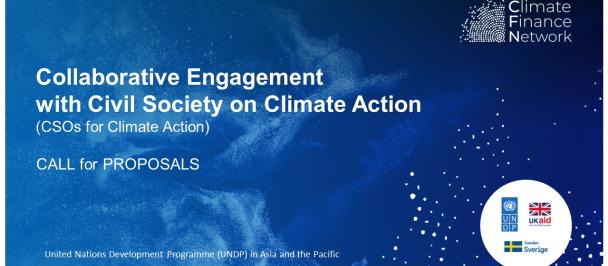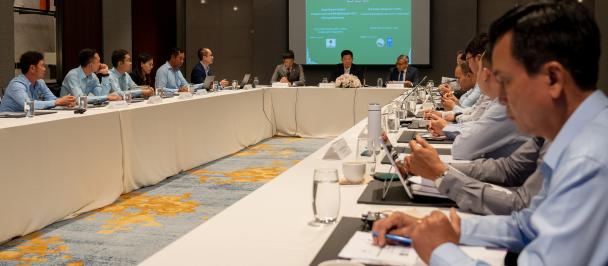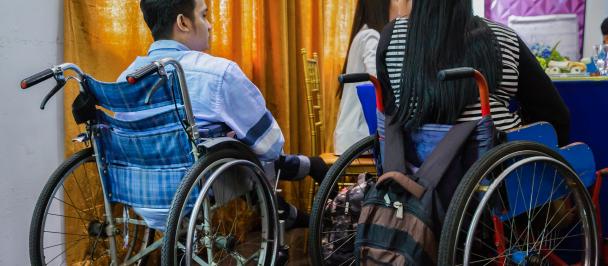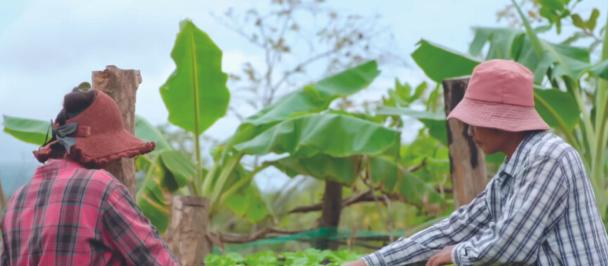Opening Remarks by Ms Alissar Chaker, Resident Representative, UNDP Cambodia
SDG (Climate Change Adaptation) Enabling Investments in Cambodia: A Sectoral Perspective
January 28, 2024
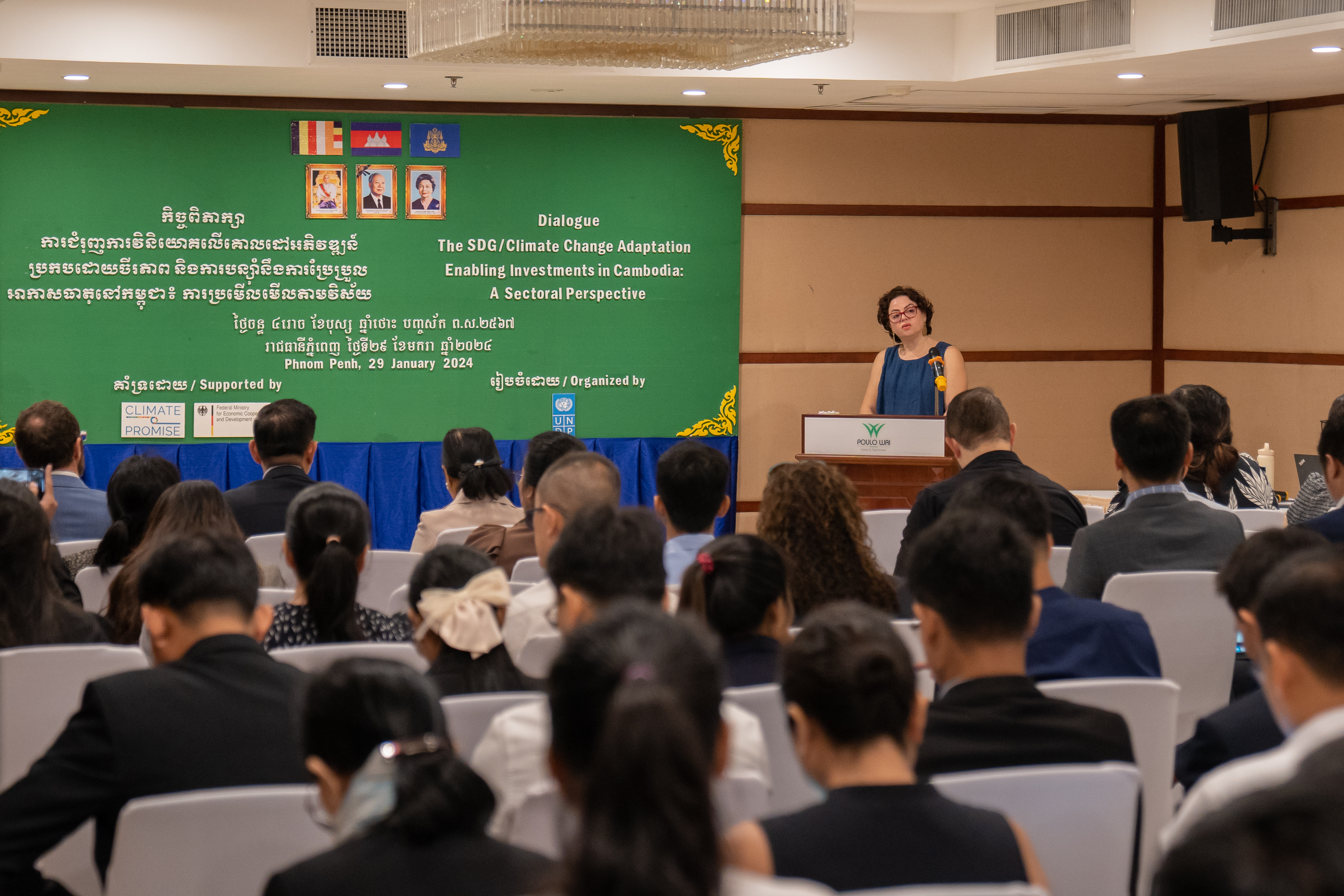
Good morning excellencies; representatives from government, investors, enterprises, NGOs, academia, and development partners,
I am glad to welcome you all to the SDG Investor Map deep-dive on climate change adaptation.
In 2021, UNDP and the Ministry of Economy and Finance published Cambodia’s Development Finance Assessment which highlighted the country’s shift from dependence on Overseas Development Assistance (ODA) to domestic revenues for financing development. ODA flows, which include both grants and loans, remained significant at 7.9 percent of GDP in 2020, but are expected to fall to 7.4 percent by 2025. At the same time, their composition has increasingly shifted from grants to loans, and often with less concessional terms. As such, the private sector will play an increasing role in expanding domestic revenues. So, leveraging strategic decisions and capital markets is critical for unlocking resources and channeling them where they are most needed, and where they can have the greatest impact on the Kingdom’s economy and its people.
Given the significant opportunity and need for private sector involvement in accelerating development and achieving the SDGs, UNDP and the Ministry of Economy and Finance launched in 2022 the first-ever SDG Investor Map for Cambodia. It is intended as a market intelligence tool, which maps out domestic SDG-aligned investment opportunity areas for informing private investors on potentially viable investments that are at the same time good for society. The Map identified 15 Investment Opportunity Areas falling under six key sectors: education, healthcare, financial services, agriculture and allied industries, infrastructure, and renewable energy.
The need for SDG financing has grown more pressing than ever. The Organization for Economic Cooperation and Development (known as OECD) estimated in 2022 that achieving the SDGs by 2030 will require overcoming a yearly US$4 trillion financing gap. This corresponds to less than 1% of global finance to fill this gap but it requires a shift in the narrative and business as usual embedding sustainability considerations to build a future fit global economy. It is also critical for Cambodia, not only for achieving the SDGs but also for financing its development as it graduates as a Least Developed Country and strives to become an upper middle-income country by 2030 and upper income in 2050 as per the Pentagonal Strategy Phase I 2024-2028.
Today we are taking a step forward with the deep dive on private investment opportunities in climate change adaptation. This is key for Cambodia, as it ranks amongst the most vulnerable countries to climate change. Based on modeling conducted in 2019 by UNDP, the Ministry of Economy and Finance, and the Ministry of Environment , it was estimated that climate change is likely to reduce absolute GDP by 2.5 percent by 2030 and by almost 10 percent by 2050. A World Bank report published in 2023 reached similar findings .
Climate change is also expected to affect the private sector in the country. In the same report, the World Bank estimated that climate change is projected to lower productivity by 8-20% and reduce tourism revenues by 8-17% in 2050. Also, the average annual losses to factories, roads, housing, schools, and health centers from floods are projected to increase from US$0.5 billion in 2020 to US$3.3-10.6 billion in 2050. These figures are alarming and reflect the urgency to scale up climate adaptation investments to increase the resilience of Cambodia’s economy and society to climate change.
The country has already defined an ambitious and forward-looking climate agenda. Accelerating the implementation of this agenda should be the focus now. Increasing investments, including by the private sector, is one of the most important prerequisites to do so. Climate action also offers several opportunities. For example, we estimate that investments for the Long-Term Strategy on Carbon Neutrality will deliver an additional growth of 7.5% of GDP per year by 2050 and will generate 321,000 green jobs. This includes significant adaptation co-benefits in making the economy more resilient. In the industrial sectors, promoting green technologies and resource efficiency will increase economic competitiveness. Moreover, embracing pathways for green growth has the potential to mobilize sustainable finance, contributing to Cambodia's objectives to attract higher-quality investments and diversify trade.
It is against this background that we are starting this dialogue to raise awareness on investment opportunities in climate change adaptation, share ideas on fostering private sector engagement, advocate for enabling conditions for scalable investments, and identify the incentives for the development of a solid adaptation pipeline. Building on the SDG Investor Map, the discussion today will focus on 4 sectors: healthcare, food and beverage, renewable energy, and infrastructure. Some of the areas directly address both domestic needs and export-oriented growth opportunities which will create additional revenue streams for the country.
We hope the planned sector deep dive discussions will be the first step towards strengthening the value chain for the flow of sustainable finance into Cambodia for climate adaptation. The discussions are expected to help us unpack opportunities around financing needs within the business ecosystem, policy and regulatory challenges and opportunities, prospects for boosting cohesiveness between different actors in the business ecosystem and identify possible building blocks for integrating sustainability and impact considerations into both policy and business as usual practices in the private sector. Your valuable insights will help us put together an action plan and identify collaborators to work together with for people and planet-centric growth in Cambodia.
To land some of these discussions in the Cambodian context, we have also aligned a showcase of local pioneer enterprises that will share their solutions for potential net positive impacts on the climate. They are part of a Growth Stage Impact Venture program we are currently supporting with the UNDP Geneva, Regional Office. They have been a true inspiration for us, and we hope you will do too.
In conclusion, I would like to thank my UNDP colleagues in Cambodia and the UNDP Sustainable Finance Hub for organizing this event which supports more broadly our efforts to increase finance for the SDGs, hoping it will not be a one-off dialogue since success depends on the continued dialogue among policymakers, development partners, and the private sector to stimulate further action, facilitate the exchange of best practices, and inform policies that can help design and upscale successful business models.
I look forward to your insights and wish you a very successful meeting and fruitful deliberations
Thank you.

 Locations
Locations
